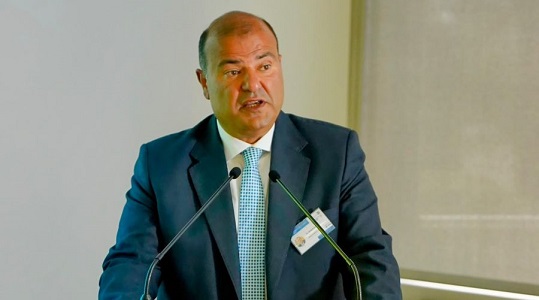The Secretary General of the Union of Arab Chambers, His Excellency Dr. Khaled Hanafi, affirmed during his speech at the opening of the conference “Reconsidering Participation in Banking Services in the Long Term to Achieve Sustainable Development,” organized by the Swiss Arab Chamber of Commerce and Industry, which operates under the umbrella of the Union of Arab Chambers, at the International Institute in Geneva - Switzerland, during the period 22 and 23 February 2024, that “The Arab world, like most parts of the world, faces urgent challenges. Despite the presence of youth and a dynamic population, 63 percent of adults in the region are still unbanked, which hinders their participation in economic development and prosperity.” He noted, "Climate change threatens our lands and resources, and for this reason, we demand innovative solutions. Social inequalities still exist, which requires the provision of development strategies."
He stressed, “The Islamic finance industry in the Arab world amounts to about 2.7 trillion dollars, which indicates a commitment to ethical and sustainable banking practices.” Pointing out that "initiatives such as the Arab Financial Inclusion Initiative help bridge the financial gap, in order to facilitate millions of people's access to basic financial services."
His Excellency Khaled Hanafi stated, “Young entrepreneurs across the region are harnessing financial technology to advance innovation and financial inclusion. However, we still have to work harder. Financial inclusion among Arab women is very modest, which limits their economic potential and contribution to society. In addition, energy financing remains limited, hindering our transition to a greener future. Hence, dealing with the complexities of regulatory frameworks often frustrates the work of both banks and innovative FinTech players.”
He considered that “we cannot achieve true sustainability without aligning banking practices with the United Nations Sustainable Development Goals.” He explained, “The Arab region is at the forefront of initiatives such as the Green Bond Framework and the Regional Climate Finance Initiative. However, there is a lot that we need to do. We must adopt fair environmental and social governance frameworks and implement them effectively.”
His Excellency the Secretary-General believed that “rethinking engagement is not just about adopting new technologies or a new business framework. Rather, it is about fundamentally changing our mentality and recognizing that banks have played a vital role in building a more just, equitable, and sustainable future.”
He said, "We are meeting today not only to share knowledge, but to forge a new path for the banking sector and transform it from a mere sector based on financial transactions, into a powerful engine for sustainable development in the long term. I can confirm that the Arab world is committed to achieving this common vision. Hence, we must work to pool our knowledge and capabilities and share best practices in order to make the sector a banking sector that not only serves individual profits but also serves the collective prosperity of our societies and peoples.”
He concluded: “Let us use this event as a starting point for action and not just for presenting ideas. Let us work to make concrete commitments to reshape our banking practices in order to move towards a more sustainable future.”
Source (Union of Arab Chambers)

